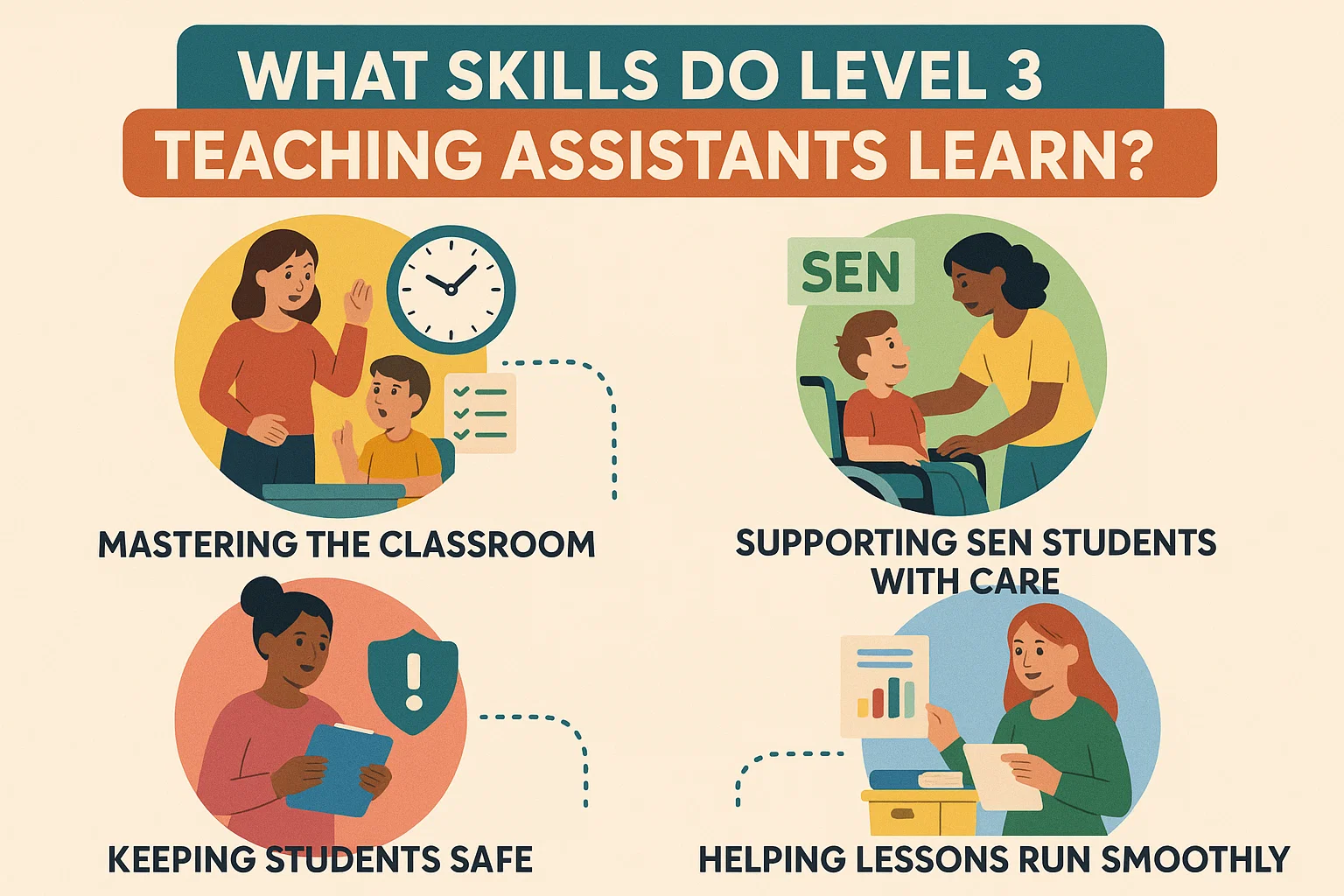No products in the cart.
What is a Level 3 Teaching Assistant (TA)? It’s a trained classroom professional who helps students more independently than a Level 2 TA. For example, they run small-group sessions, give 1:1 support, and cover lessons when needed.
Typically, most teaching assistant courses, Level 3 programs, take about 8–12 months for college or online study, or around 18 months for an apprenticeship. Moreover, in 2025, the usual Level 3 TA UK salary is £12–£14 per hour outside London, and it increases with London weighting or SEN/HLTA duties.
Throughout this guide, we’ll explore exactly what a Level 3 TA does, the skills and qualifications you need, pay expectations in 2025, career progression opportunities, and common questions to give you the full picture.
What is a Level 3 Teaching Assistant and What Does It Mean?

A Level 3 Teaching Assistant (TA) is more than just a classroom helper—it’s a nationally recognised qualification (like NCFE/CACHE, City & Guilds, or TQUK) that shows you can plan and run activities, support small groups or 1:1, and track student progress while working with a teacher. You become someone the students and teachers can really rely on.
Compared to Level 2, a Level 3 TA works more independently. Level 2 mainly helps with routine tasks, while Level 3 can lead activities, support children who need extra help, and make a real difference in learning.
From there, the next step is HLTA (Level 4/status), where you can run whole lessons and take on leadership. Moving from Level 2 to Level 3 means more responsibility, stronger skills, and a bigger role in helping students succeed.
What Qualifications Do You Need for Level 3 TA?
To start a Level 3 Teaching Assistant (TA) course, you usually need GCSEs or Functional Skills in English and maths (grade 9 4/C). You’ll also need either a Level 2 TA qualification or some hands-on experience in a school or childcare setting.
Luckily, there are a few ways to train. You can study part-time at college, take an online or distance course with a tutor, or choose a Level 3 teaching assistant apprenticeship, which lets you earn while you learn. Most diploma courses also include placement or observation hours in a real classroom, so you get practical experience and a feel for the job.
In general, courses take about 8–12 months if you study at college or online, or around 18 months for apprenticeships. By the end, you’ll feel ready and confident to step into a Level 3 TA role and make a real difference in the classroom.
What Skills Do Level 3 Teaching Assistants Learn?

Mastering the Classroom
Learn how to create smooth routines, encourage positive behaviour, and help students move confidently between activities. It’s all about keeping the classroom calm and focused.
Supporting SEN Students with Care
Discover how to adapt tasks, use visuals or timers, and follow IEP/EHCP strategies. This ensures every child, no matter their needs, gets the support they need to succeed.
Keeping Students Safe
Gain the knowledge to report concerns the right way, follow the DSL route, and work in line with KCSIE guidelines, keeping students protected at all times.
Helping Lessons Run Smoothly
Prepare resources, deliver set activities, and track student progress so teachers can plan the next steps effectively.
By mastering these Level 3 TA skills, you’ll gain confidence, make a real impact in the classroom, and support learning, safeguarding, and SEN needs effectively.
What Roles Can a Level 3 TA Do in Schools?
A Level 3 TA does lots of different jobs in school, helping both students and teachers every day. Here are the main ways they make a difference:
- Supporting Students Directly: Work with children 1:1 or in small groups for phonics, reading, or numeracy, helping them catch up and feel confident.
- Helping SEN Students: Adapt tasks, give extra support, and make learning easier for children with special needs.
- Classroom Assistance: Set up resources, take notes, and watch how students are doing so teachers can plan better lessons.
- Covering Lessons Safely: Step in if a teacher is away for a short time, making sure the class keeps running smoothly.
- Extra Activities: Help with breakfast or after-school clubs, offering extra care and making a difference outside the usual lessons.
In short, a Level 3 TA is a vital part of the school, supporting learning, keeping students safe, and helping teachers every step of the way.
How Much Does a Level 3 TA Earn in the UK?

Wondering about the level 3 teaching assistant salary in 2025? Well, outside London, most TAs earn around £12–£14 per hour. And if you’ve got some experience or take on extra duties like SEN support or HLTA tasks, you can earn a bit more.
Now, in London, the pay is usually higher because of London weighting—often around £14–£16+ per hour.
Most Level 3 TA jobs are term-time only, which means about 38–40 weeks a year, and the pay is pro-rata. That just means your annual salary depends on how many hours you work, your grade, and which school or council you’re with. Usually, that works out to £17,000–£24,000 a year if you work 25–37 hours per week.
The best part? Even though it’s term-time work, you can still earn a good wage while really making a difference in students’ lives. Plus, taking on extra duties can push your pay even higher!
Do You Need Experience to Start Level 3 TA Training?
Even if you’re new to this, there are ways to get started and gain the skills you need:
- Level 2 or relevant experience: Many providers accept students who have a Level 2 TA qualification or experience in classrooms, childcare, or tutoring.
- School placements: Most Level 3 courses include observation or placement hours in a real school, so you can see how it works day-to-day.
- Volunteering counts: If you’ve helped out in a classroom or as a TA, that experience can count—as long as your tasks match what you’re learning.
- Apprenticeships: You get paid work and hands-on experience at the same time, which is a great way to build confidence.
So, don’t worry if you’re just starting out. With volunteering, a diploma, or an apprenticeship, you can step into Level 3 TA training and grow your skills while making a real difference for students.
Difference Between TA Levels (1, 2, 3 & HLTA)
Level 1 TA
This is where most people start. You help with basic classroom tasks, support students when needed, and assist the teacher. No qualifications are required, so it’s perfect if you want to get a feel for working in a school.
Level 2 TA
Next, you get some foundation knowledge and can help more actively with learning activities. These roles are often part-time or voluntary, giving you a chance to gain confidence and hands-on experience.
Level 3 TA
At this level, you take on more responsibility. You can work independently with students, provide SEN support, assist with lesson prep, and even run small-group interventions. This makes you an important part of the classroom team.
HLTA (Higher Level Teaching Assistant)
HLTAs step up even further. You can lead whole lessons, assess pupils, manage classroom behaviour, and take on leadership tasks. Pay is higher, and you get more freedom, almost like a semi-teacher role.
In short: Level 1 = getting started, Level 2 = helping more confidently, Level 3 = advanced support and responsibility, HLTA = semi-teaching role with leadership and higher pay.
What Are the Career Progression Options After Level 3?
After finishing Level 3 TA training, you have some exciting paths to grow your career:
- Step up to HLTA: Moving from Level 3 to HLTA gives you more freedom in the classroom. You can cover lessons, take on extra responsibilities, and feel more confident in your role.
- Become an SEN specialist: Many TAs focus on supporting students with special needs, like communication, behaviour, or ELSA support. These roles often come with higher pay and more responsibility.
- Train to become a teacher: If you meet the entry requirements, your Level 3 experience can help you start teacher training like QTS, PGCE, or school-based programs, giving you a clear path to a teaching career.
To sum it up, Level 3 gives you the chance to move up to HLTA, specialise in SEN, or even become a teacher, helping you grow in your career while really making a difference for students.
FAQs
- What is a Level 3 teaching assistant equivalent to?
It’s above Level 2 TA and below HLTA. You have more responsibility and can support students independently.
- Do Level 3 teaching assistants get paid more?
Yes! Level 3 TAs usually earn more than Level 2, especially if they do SEN support or cover lessons.
- What is the role of a Level 3 teaching assistant?
You support students 1:1 or in small groups, help with lesson prep, run activities, and sometimes cover lessons.
- How long does it take to become a Level 3 teaching assistant?
About 8–12 months for college or distance learning, or around 18 months as an apprentice.
- What jobs can I do with a Level 3 teaching assistant qualification?
You can work as an advanced classroom TA, SEN support TA, or HLTA in training, or you can eventually train to become a teacher.
- Can a Level 3 TA teach a class?
Not fully. You can cover lessons under supervision, run activities, or support learning, but full teaching is usually at the HLTA or teacher level.
Yes! Many nurseries accept Level 3 TAs, especially for supporting learning and development with young children.
Final Thoughts: Is Level 3 TA Right for You?
You might be asking yourself, “What is a Level 3 teaching assistant, and is it worth it?” Honestly, it’s the next step that gives you more responsibility and a bigger role in the classroom. You get to lead small-group activities, support assessments, and even cover lessons under supervision—all while earning better pay.
Plus, Level 3 opens the door to HLTA roles or SEN specialism, so your career can grow in ways that really matter. If you have your GCSEs or Functional Skills, can secure a school placement, and want to move forward, then Level 3 training in 2025 is a smart choice.
All in all, Level 3 is more than just a qualification. It’s a chance to learn, feel confident and help students while building a career you enjoy.
Step into your teaching career now! Enrol in the Teaching Assistant Course at Open Learning Academy. and start shaping young minds today.




